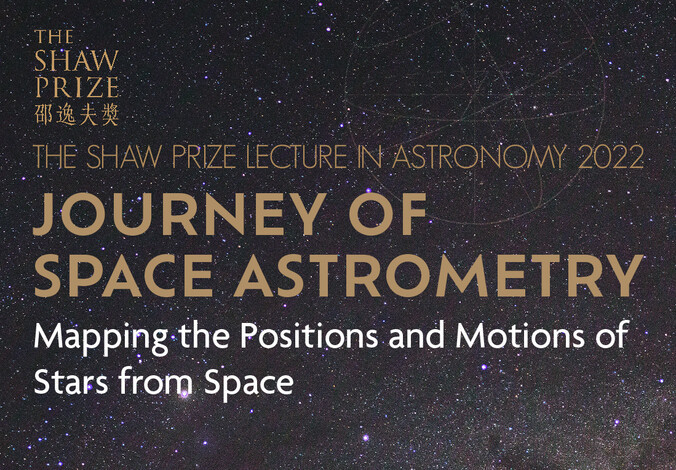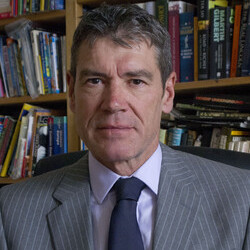
- Date & Time
- September 30, 2022 (Friday) | HKT 5:30pm/ UTC 9:30am
- Venue
- on ZOOM (https://bit.ly/39V24Hu)
- Speaker
- Professor Lennart LINDEGREN
2022 Shaw Laureate in Astronomy; Professor Emeritus, Department of Astronomy and Theoretical Physics, Lund Observatory, Lund University, Sweden - Professor Michael PERRYMAN
2022 Shaw Laureate in Astronomy; Adjunct Professor, School of Physics, University College, Dublin, Ireland
Established under the auspices of Sir Run Run Shaw, the Prize honours individuals who are currently active in their respective fields and who have achieved significant breakthroughs in academic and scientific research or applications, and whose works have resulted in a positive and profound impact on mankind.
The Shaw Prize in Astronomy 2022 is awarded in equal shares to Lennart Lindegren, Professor Emeritus, Department of Astronomy and Theoretical Physics, Lund Observatory, Lund University, Sweden and Michael Perryman, Adjunct Professor, School of Physics, University College Dublin, Ireland for their lifetime contributions to space astrometry, and in particular for their role in the conception and design of the European Space Agency’s Hipparcos and Gaia missions.

Programme rundown:
Welcoming Address & Introduction of Speaker by Dr Man Hoi LEE Head and Associate Professor, Department of Earth Sciences, Faculty of Science, HKU |
Lectures on Space Astrometry: |
‘Why Are We Measuring Star Positions From Space?’ by Professor Michael PERRYMAN 2022 Shaw Laureate in Astronomy Adjunct Professor, School of Physics, University College, Dublin, Ireland Study Scientist and Project Scientist for the Gaia mission Project Scientist for the Hipparcos mission |
‘Fundamental Concepts For Global Astrometry’ by Professor Lennart LINDEGREN 2022 Shaw Laureate in Astronomy Professor Emeritus, Department of Astronomy and Theoretical Physics, Lund Observatory, Lund University, Sweden Member of the Gaia Science Team Member of the Royal Swedish Academy of Sciences |
Q&A Session |
The End |
About the Laureate
Professor Michael Perryman was born in 1954 in Luton, UK and is currently Adjunct Professor, School of Physics at University College Dublin, Ireland. He received his Bachelor’s degree in Mathematics and Theoretical Physics in 1976 and obtained a PhD in 1980 from the University of Cambridge, UK. He joined the European Space Agency (ESA) in 1980 and was nominated as Project Scientist (1981–1997) for the Hipparcos mission, and subsequently Study Scientist (1995–2000) and Project Scientist (1995–2008) for the Gaia mission. During his service in ESA, he had been Professor of Astronomy (1993–2009) at Leiden University, The Netherlands. He held a joint position at the University of Heidelberg and the Max Planck Institute for Astronomy, Germany in 2010. A year later, he joined the University of Bristol, UK as visiting Professor of Physics (2011–2012). He has been Adjunct Professor at the University College Dublin since 2012.
Lecture Abstract
Professor PERRYMAN will first look at the scientific aspects of this exciting journey. Firstly, he will put their modern space measurements in the historical context and summarise what astronomers have learnt from measuring star positions over the past few hundred years. After that, a few of the remarkable scientific advances which are resulting from the extremely accurate measurements of star positions from space, and also a little of what this is telling us about our place in the Universe will be covered.
About the Laureate
Professor Lennart Lindegren was born in 1950 in Sweden and is currently Professor Emeritus of Lund Observatory, Department of Astronomy and Theoretical Physics at Lund University, Sweden. He received his PhD in 1980 from Lund University. He joined as a member of the teaching staff at Lund University and became Full Professor of Astronomy in 2000, serving until his retirement in 2017. During his time at Lund Observatory, he had served as the Director for six years. He was a member of the European Space Agency’s Hipparcos Science Team (1976–1997) and Gaia Science Advisory Group (1997–2000). He leads the scientific implementation of the Astrometric Global Iterative Solution in the Gaia Data Processing and Analysis Consortium and is also a member of the Gaia Science Team (2001–). He also served as Project Coordinator for the Marie Curie Research Training Network ELSA (2006–2010). He is a member of the Royal Swedish Academy of Sciences.
Lecture Abstract
Professor LINDEGREN will describe how optical observations using a scanning satellite allow us to measure accurate absolute parallaxes and proper motions, and to build a rigid reference frame over the whole celestial sphere. The principle was first applied to Hipparcos data in the 1990s, and the same principle is now used for Gaia. The intertwined measurements of all objects bring formidable data-processing challenges that could not be mastered for Hipparcos without certain approximations. The exponential growth in computing power since then makes it possible to treat the Gaia data much more rigorously, in spite of the immensely larger data volume.
Revisiting the Shaw Prize Lecture:
Speaker Professor Lennart LINDEGREN
2022 Shaw Laureate in Astronomy; Professor Emeritus, Department of Astronomy and Theoretical Physics, Lund Observatory, Lund University, Sweden
Professor Lennart Lindegren was born in 1950 in Sweden and is currently Professor Emeritus of Lund Observatory, Department of Astronomy and Theoretical Physics at Lund University, Sweden. He received his PhD in 1980 from Lund University. He joined as a member of the teaching staff at Lund University and became Full Professor of Astronomy in 2000, serving until his retirement in 2017. During his time at Lund Observatory, he had served as the Director for six years. He was a member of the European Space Agency’s Hipparcos Science Team (1976–1997) and Gaia Science Advisory Group (1997–2000). He leads the scientific implementation of the Astrometric Global Iterative Solution in the Gaia Data Processing and Analysis Consortium and is also a member of the Gaia Science Team (2001–). He also served as Project Coordinator for the Marie Curie Research Training Network ELSA (2006–2010). He is a member of the Royal Swedish Academy of Sciences.

Speaker Professor Michael PERRYMAN
2022 Shaw Laureate in Astronomy; Adjunct Professor, School of Physics, University College, Dublin, Ireland
Professor Michael Perryman was born in 1954 in Luton, UK and is currently Adjunct Professor, School of Physics at University College Dublin, Ireland. He received his Bachelor’s degree in Mathematics and Theoretical Physics in 1976 and obtained a PhD in 1980 from the University of Cambridge, UK. He joined the European Space Agency (ESA) in 1980 and was nominated as Project Scientist (1981–1997) for the Hipparcos mission, and subsequently Study Scientist (1995–2000) and Project Scientist (1995–2008) for the Gaia mission. During his service in ESA, he had been Professor of Astronomy (1993–2009) at Leiden University, The Netherlands. He held a joint position at the University of Heidelberg and the Max Planck Institute for Astronomy, Germany in 2010. A year later, he joined the University of Bristol, UK as visiting Professor of Physics (2011–2012). He has been Adjunct Professor at the University College Dublin since 2012.


